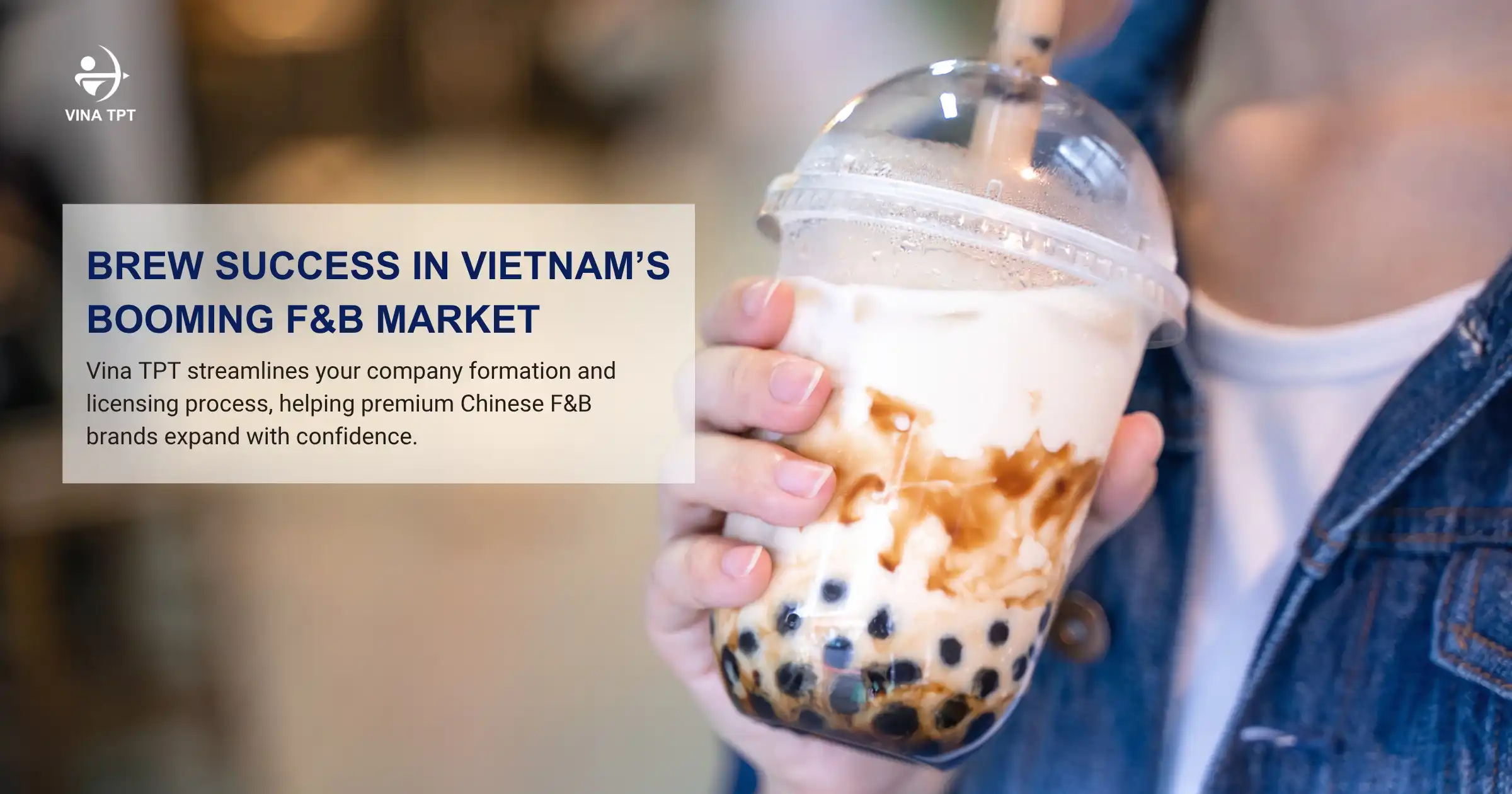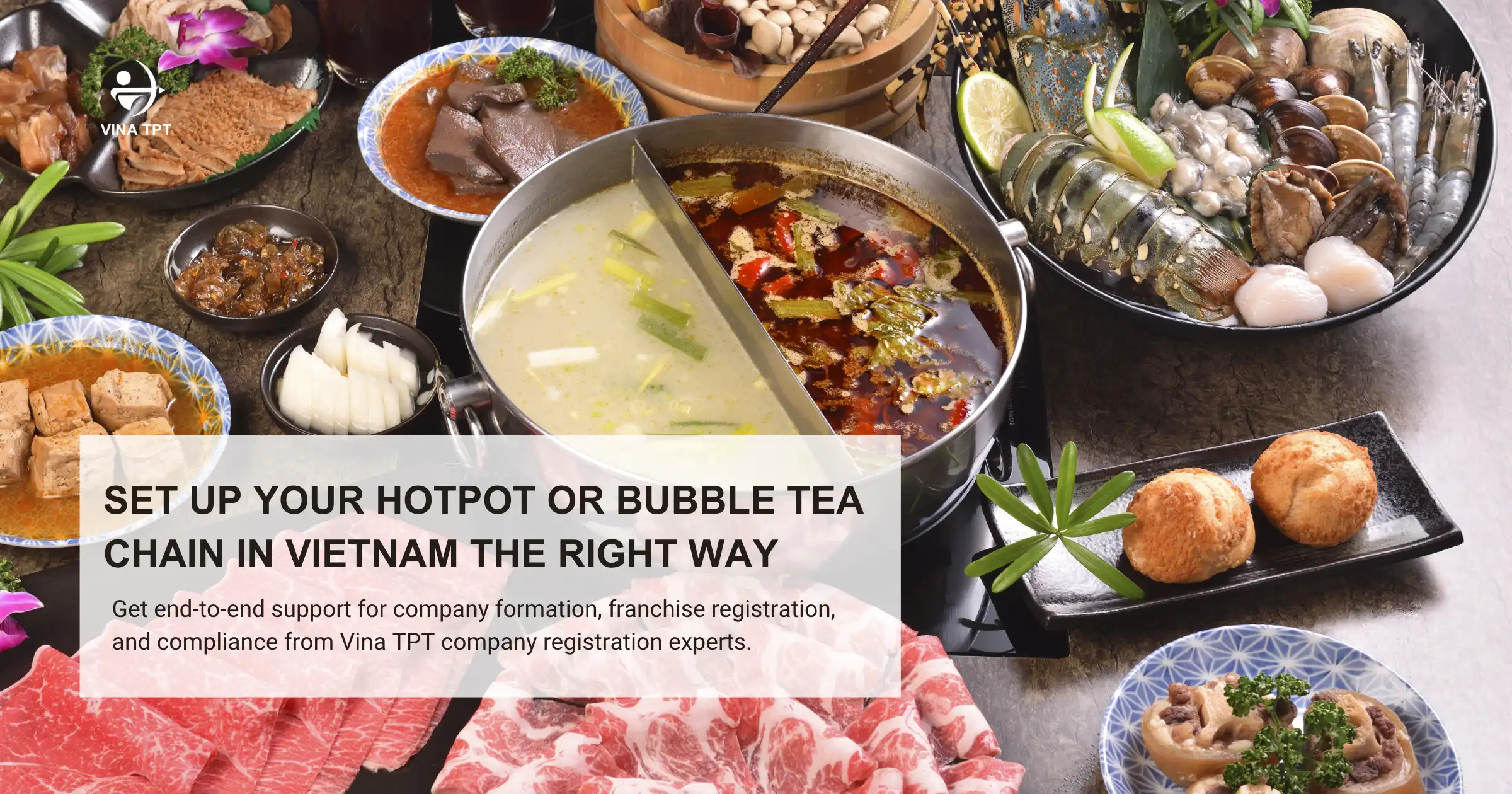1. Why Chinese Hotpot and Bubble Tea Chains Are Eyeing Vietnam Now
In recent years, Vietnam has become a top attractive destination for hotpot and bubble tea chains from China. This attraction comes from the impressive growth rate of the F&B market, the strong expansion of the middle class, and the experiential consumption trend of Gen Z in large cities such as Ho Chi Minh City, Hanoi and Da Nang.
According to a report by Vietnam Briefing (2024), the scale of the food service industry in Vietnam has reached 688.8 trillion VND, equivalent to about 27.3 billion USD, an increase of 16.6% compared to the previous year. Similarly, research by iPOS.vn and Nestlé Professional shows that the Vietnamese F&B industry will maintain a growth rate of about 9.6% per year in the period 2024-2025. Looking further ahead, Mordor Intelligence estimates that the Vietnamese food-service market will reach a size of 41.22 billion USD by 2030, with an average growth rate of 10.7%/year.
These figures clearly reflect the huge potential of the Vietnamese culinary industry, where the demand for dine-out and chain models is growing. With advantages in raw material supply, reasonable premises costs and a young population that loves to experience, Vietnam is becoming a “golden land” for hotpot and bubble tea brands from China.
However, opportunities always go hand in hand with challenges. To be successful, brands not only need to understand the procedures for registering a company or the company formation process, but also need to deeply understand local culinary culture, taste and consumer behavior, key factors that help turn the market boom into a sustainable advantage.
2. The Real Challenge: Localization, Not Just Licensing
Many Chinese brands entering Vietnam face difficulties not in licensing, but in adapting to the market (localization).
Vietnamese people prefer lighter, less spicy, less greasy tastes compared to Chinese cuisine. In addition, rental costs in central areas are increasing rapidly, while requirements for experience space, especially for high-end hotpot models, are increasingly strict.
Human resources to operate a chain of many branches is also a big challenge. Chinese brands inherently have a methodical process, but when applied in Vietnam, they need to standardize training, quality control and service processes to ensure consistency.
Therefore, licensing is just the tip of the iceberg. The bigger problem lies in adapting the operating model to suit the consumer culture and legal environment in Vietnam.

3. Choosing the Right Entry Model: Direct Ownership vs. Master Franchise
Before starting to register a company, investors need to determine the market penetration model. There are two popular strategies:
Direct Ownership (Self-investment and operation)
- Advantages: Full control over the brand, product quality and customer experience.
- Disadvantages: High investment costs, longer time to apply for licenses and set up operations.
- Suitable for: Large brands that want to build a high-end image, create the first flagship store in Vietnam.
Master Franchise (Regional franchising)
- Advantages: Helps brands expand quickly, reduce financial risks and take advantage of local networks.
- Disadvantages: Requires a clear mechanism for quality monitoring, training and profit sharing.
- Suitable for: Bubble tea chains or fast-casual hotpots that want to quickly cover the market.
In fact, many Chinese brands have chosen to combine both models: opening the first store directly to control the image, then franchising to expand to other provinces and cities.
Whichever direction is chosen, investors need to follow the company formation process and comply with the legal regulations on franchise business in Vietnam – including registering the franchise contract with the Ministry of Industry and Trade and periodically declaring taxes.
4. Building a Compliant but Scalable Operation
For hotpot or bubble tea chains to expand sustainably in Vietnam, building a legal foundation and licensing right from the beginning is a vital factor. Many international F&B brands have encountered difficulties when developing in Vietnam not because of their products or marketing strategies, but because they have not established a tight legal and operational system from the beginning. When starting a business in Vietnam, F&B businesses need to complete the following procedures:
- Investment Registration Certificate (IRC) if there is a foreign capital element.
- Enterprise Registration Certificate (ERC) to legally establish a company in Vietnam.
- Registering conditional business codes: including food and beverage (5610), food processing (1079), and beverages (4722).
The estimated time for completion is:
- Document preparation: 1-2 weeks, depending on the volume of documents and the level of complexity.
- IRC appraisal: 20-45 working days.
- ERC issuance: 10-20 working days after IRC (or similar if the enterprise is a domestic enterprise).
Applying for “sub-licenses” (operational licenses) including:
- Food Safety Certificate.
- Fire prevention and fighting license for each facility.
- Alcohol sales license (if any).
- Registering environmental and labor hygiene according to the scale of the restaurant.
These licenses are issued by different agencies (Department of Finance, Department of Food Safety, Fire Police…), so it requires smooth coordination in the documents.
5. Your Strategic Next Step
As the Vietnamese F&B market is entering a period of fierce competition, having a consulting partner with a good understanding of the local legal and business environment will not only help businesses “open a shop”, but also “build a sustainable brand”. This is the value that Vina TPT company registration brings to F&B chains from China.
With more than 20 years of experience in registering a company and consulting on company formation for foreign businesses, Vina TPT has a deep understanding of each stage that a brand must go through – from the initial market survey, choosing an investment model, to completing legal documents and implementing chain operations.
Vina TPT’s team of experts not only handles administrative procedures, but also accompanies businesses as strategic advisors, helping them:
- Consulting on suitable legal models: choosing between 100% foreign capital, joint ventures, or franchise business to optimize control and cost advantages.
- Set up a complete investment profile & business registration package: prepare all IRC, ERC documents, register conditional industry codes for F&B, and apply for operating licenses.
- Ensure compliance with local regulations: detailed guidance on tax, accounting, human resource management, and standardize operating procedures to meet inspection and testing requirements.
With professional support from Vina TPT company registration, businesses no longer have to worry about legal risks or complicated procedures – instead, they can focus all their efforts on developing their brand, improving customer experience and expanding market share in one of the most dynamic F&B markets in Southeast Asia.
Let Vina TPT become your strategic partner to help you start your business journey in Vietnam legally, effectively and sustainably.


